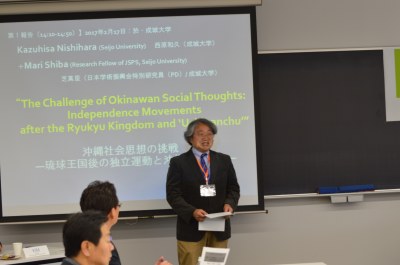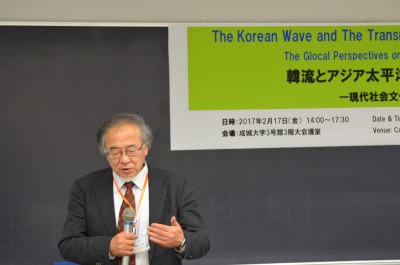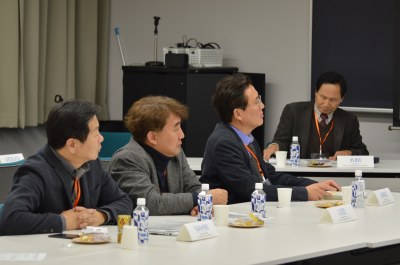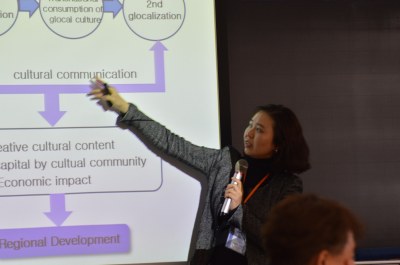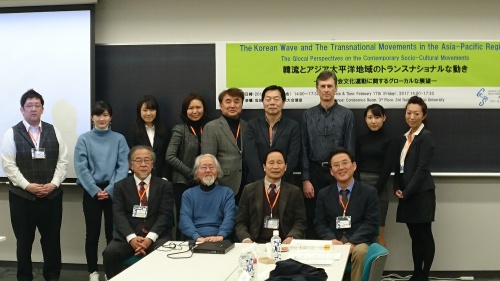

NEWS
2017.03.06
Kazuhisa Nishihara (Faculty of Social Innovation, Seijo University)
On Friday, February 17, 2017, 14:00–17:00, Seijo University’s Center for Glocal Studies hosted an international research conference, titled “The Korean Wave and Transnational Movements in the Asia-Pacific Region: Glocal Perspectives on Contemporary Socio-Cultural Movements.” The conference consisted of four presentations delivered by seven speakers.
The first presentation was delivered by Mari Shiba (Postdoc at the Japan Society for the Promotion of Science; Seijo University) and myself; the second was delivered by Dennis Riches (Seijo University); the third was delivered by Won-ho Jang and Jung Eun Song (both University of Seoul); the fourth was by Kee-Bom Nahm (University of Seoul), Byungmin Lee (Konkuk University), and Changwan Park (University of Seoul; Park did not attend the conference in person).
The conference was the result of a meeting that I (Kazuhisa Nishihara) had with Won-ho Jang, with whom I enjoyed a warm rapport. Jang had approached me about the prospect of holding such a conference. I wholeheartedly agreed to the idea, having recognized that our research organizations were similarly oriented. Jang manages the University of Seoul’s Glocal Culture and Regional Development Research Division, which forms part of the Social Science Korea (SSK) Human Rights Forum, and his research work focuses on glocal culture in East Asia and its transnational nature. Similarly, my interest and that of my colleagues lie in recent transnational-people exchanges in the Asia-Pacific region. Accordingly, we decided that there should be two presentations from members of Seijo University and two presentations from our Korean visitors. The conference was moderated by Ik Ki Kim (Renmin University of China), whose expertise lies in Japanese, Chinese, and Korean studies.
* * *
The first presentation was titled, “The Challenge of Okinawan Social Thought: Independence Movements After the Ryukyu Kingdom and ‘Uchinanchu.’” Mari Shiba and I discussed the history of transnational and glocal movements for Okinawan autonomy, focusing on both the ideals and practices of these movements.
The second presentation was titled “Challenging the Occupation of Hawai’i Under International Law: An Overview of Contemporary Actions and Strategies of the Acting Government of the Kingdom of Hawai’i.” As this title suggests, Dennis Riches discussed the Kingdom of Hawai’i as a local actor that has signed treaties globally (i.e., with states around the world) and how these treaties legitimize the current movement for Hawaiian independence from the USA (the content of Riches’ presentation appears in Tomiyuki Eusugi [ed.], Shakai Sesshoku no Gurōkaru Kenkyū [Social Connections in Glocal Studies]).
The third presentation was titled, “Understanding Glocalization: With Cases From the Korean Wave.” Focusing on the rise of K-pop, Won-ho Jang and Jang Eun Song argued that glocal culture emerges as a hybrid of different national cultures in the course of globalization. They also argued that glocal culture is subject to transnational proliferation and consumption, which in turn generates further glocal culture. According to the presenters, the globalization of East Asia generates “primary glocalization,” which is receptive in nature, and “secondary glocalization,” which is generative. Both forms of glocalization, they argue, have spurred creative cultural developments across a wide region—an intriguing argument.
The fourth and final presentation was titled, “Sustainable Tourism Development Factors for the Five UNESCO Living Heritage Cities in East Asia,” these cities being Shirakawa (Japan), Luang Prabang (Laos), Lijiang (China), Hoi An (Vietnam), and Hahoi Maeul (South Korea). In this presentation, Kee-Bom Nahm and Byungmin Lee discussed policies concerning these cities, the lives of the people living there, and these cities’ tourist trends. The presentation reaffirmed how foreign tourists who visit UNESCO sites are glocal beings, in that they enjoy local areas through global (transnational) travel.
* * *
Each of the four presentations prominently featured glocal perspectives. The four cases were very diverse, but each case represented an attempt to unravel the nature of glocalization, and each offered intriguing insights into the potential of glocal studies. As a result of the meeting between Jang and I who preceded this conference, Seijo University’s Center for Glocal Studies will enter a research partnership with the University of Seoul’s SSK-affiliated Culture and Regional Development Research Division, with a view to facilitating further research. To this end, the conference served as a starting point for Japan-Korea glocal studies. I hope that we will continue to stimulate each other in further glocal studies.
